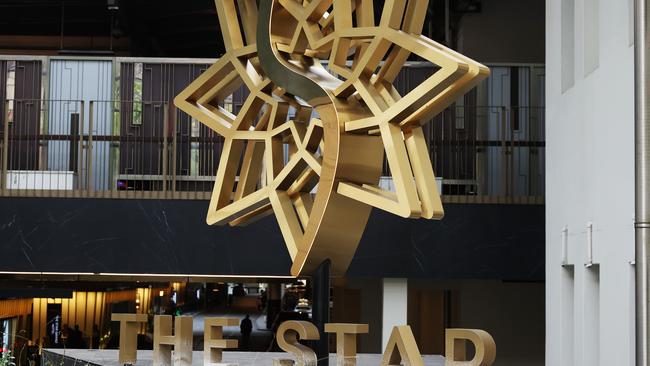‘Deplorable’ but former Star chairman still has $40k role
Former Star chairman David Foster is being paid as much as $40,000 per month by the troubled casino group, despite claims he no longer held an executive role.
Former Star chairman David Foster is being paid as much as $40,000 per month as interim chief executive of the troubled casino group, appearing to counter a submission by the company’s top lawyer that he no longer had an executive role.
Bret Walker, counsel for Star, told the Bell II inquiry on Wednesday that both Mr Foster and former chief executive Robbie Cooke were “no longer responsible for executive operations” after describing some of their actions as “deplorable”.
Mr Foster resigned as chairman last month after damaging allegations at the inquiry he and Mr Cooke spied on the NSW Independent Casino Commission-appointed manager Nicholas Weeks and “prepared for war” with the regulator. Following Mr Cooke’s departure in March, Mr Foster was named executive chair and paid an additional $40,000 per month.
According to Star’s latest ASX announcement, Mr Foster remains in an executive role while a permanent CEO is sought even after stepping down as chair. Star declined to comment further.
Adam Bell SC is conducting his second inquiry into Star’s suitability to retain its Sydney casino licence following an earlier probe found it had not met its obligations to prevent money laundering and organised crime links. He will report later this year to the NICC.
On Wednesday, Mr Walker said the hostility of Mr Cooke and Mr Foster towards the regulator was “deplorable” and would not be repeated under Star’s remediation reset.
“The use of those words by the two gentlemen in question was not indicative of the most desirable relations with the regulator and the manager,” Mr Walker said in closing submissions. “We agree with that. We’ve embraced it, and our continuing directors have no doubt it is an episode which has left some scorch marks.”
Mr Walker sought to distance Star from its recent past when it was being run by Mr Cooke and Mr Foster, describing their relationship with the NICC as an anomaly.
“There is no inherent likelihood at all of repetition, nor do they show any pattern of conduct which would extend beyond the predilections of the particular individuals in question — who are no longer responsible for executive operations,” Mr Walker said.

Non-executive director Deborah Page told the inquiry last month that Mr Foster, who was replaced by Anne Ward, had worsened poor relations with the NICC by allowing Mr Cooke to issue an exit statement that appeared to blame NICC chief commissioner Philip Crawford for his predicament. Ms Page said she was “really disappointed” that Mr Foster negotiated an arrangement that allowed Mr Cooke to release the statement. “The board strongly encouraged the chairman to stop this happening,” she said. “I personally did not want that statement issued and others expressed the same view.”
Imtiaz Ahmed SC, co-counsel for Star, also was keen this week to show Star was distancing itself from its former leadership team.
He said that while Mr Cooke had many good qualities that benefited Star, with some evidence that he “saved the company,” he appeared to have a management style that “resulted in the siloing of information”.
“Just like you can have a wartime president who has many fine skills in a particular scenario, you can also have a CEO who brings great value in some areas while not addressing other areas,” Mr Ahmed told the inquiry.
“There’s obviously an awareness of a need to obtain a new CEO, and that’s a matter that’s been progressed as a matter of priority.
“Moreover it’s a process that’s also being advanced with an awareness of the problems of the past. Merely the fact of changing a CEO in itself could be seen as a symbolic effort by the board to set a different tone within the organisation.”
He pointed to the recent appointment of Janelle Campbell as Star Sydney chief executive as a “strong voice who can set a tone from the top.”“Janelle is recognised for leading teams through transformational changes,” said Mr Ahmed said. “She possesses a unique ability to inspire her team to engage in broader business solutions, enabling them to work outside traditional lines in a collaborative and innovative way.”
Mr Ahmed said her key strength included “expertise in navigating the regulated casino environment” which was vital for the role at the Star Sydney.
Earlier the inquiry heard that Star was leaderless and susceptible to criminal exploitation as it lagged more than a year behind in remediation efforts.
Counsel assisting the inquiry Caspar Conde said a $3.2m fraud committed against Star last year involving malfunctioning cash machines showed the company was still vulnerable to criminal activities as the ranks of its senior executive team remained depleted.
Mr Conde in closing oral submissions said the fraud, which allowed winning gambling tickets to be reused in “ticket in, cash out” machines, was committed by 18 people who undertook 1800 fraudulent transactions.






To join the conversation, please log in. Don't have an account? Register
Join the conversation, you are commenting as Logout